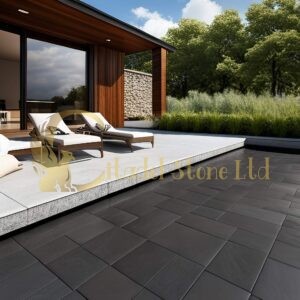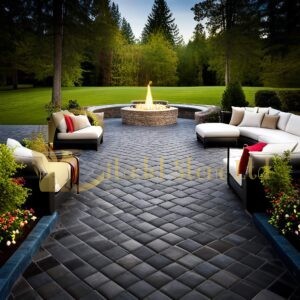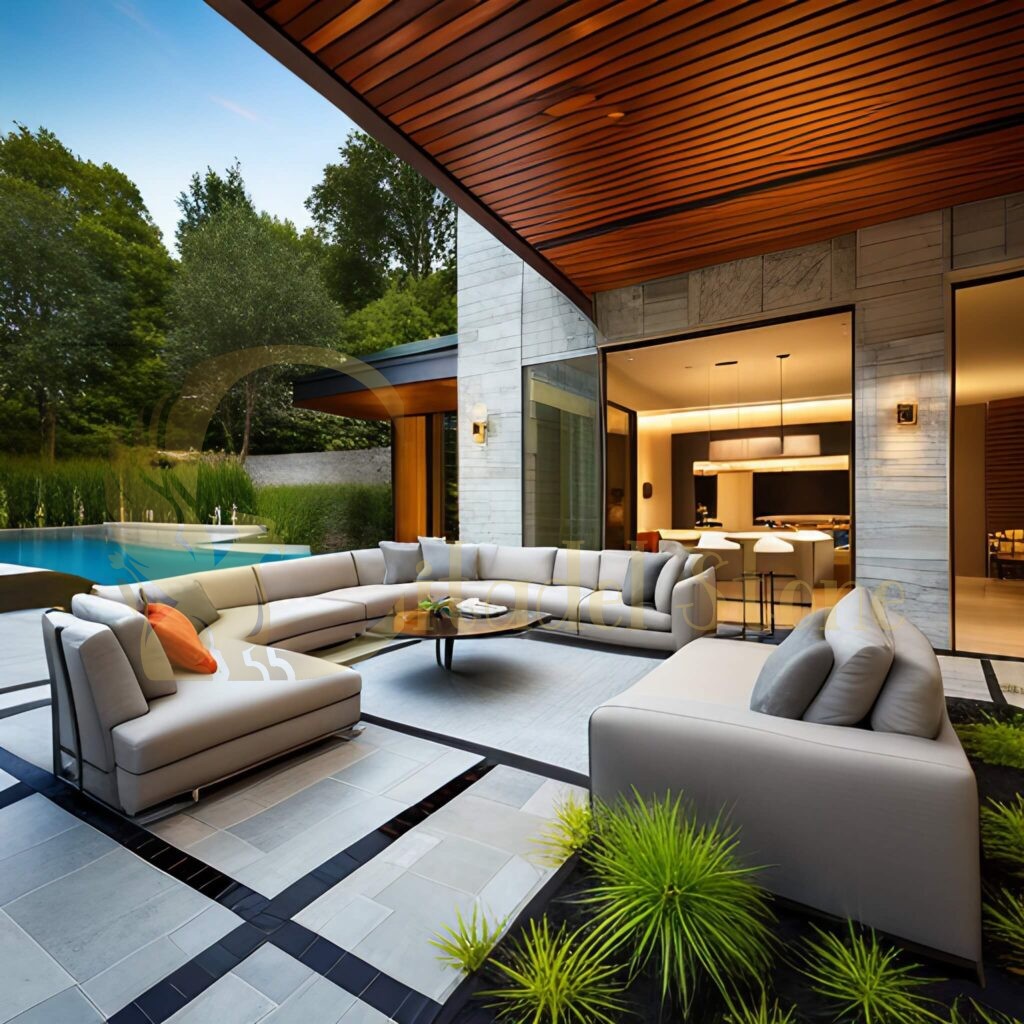1. Introduction

Choosing the right material for your outdoor space is crucial for both functionality and aesthetics. Sophisticated aesthetics with high-quality black basalt and black pavers are two popular choices that can enhance the beauty of any landscape. Each material has distinct features and advantages, making them suitable for different applications. This article aims to provide a detailed comparison of black basalt – the ultimate material for bold designs and high-impact pavers for commercial settings, helping you decide which material is the best fit for your project.
2. Understanding Black Basalt
What is Black basalt – where style meets resilience?

Choose black basalt for unmatched durability that is a dense, fine-grained volcanic rock that forms from the rapid cooling of basaltic lava exposed at or very near the surface of a planet or moon. This natural stone is known for its dark, rich color, which ranges from deep grey to jet black. Black basalt is a popular choice for various architectural and landscaping applications due to its durability and striking appearance.
Characteristics of Black Basalt
- Color and Texture: Black basalt – enhancing spaces with natural charm typically has a uniform dark color, though it can contain slight variations in shade and texture, adding a natural, unique look to each piece.
- Durability: It is extremely durable, resistant to weathering, and can withstand heavy use.
- Thermal Resistance: Durable and stylish black basalt for any application has excellent heat retention properties, making it ideal for outdoor applications in various climates.
- Slip Resistance: The natural texture of black basalt – the essence of modern architecture provides good slip resistance, even when wet, making it a safe choice for walkways and pool surrounds.
Benefits of Black Basalt
- Aesthetic Appeal: Its dark, consistent color provides a sleek, modern look that complements a wide range of design styles.
- Durability: Black basalt – naturally strong and visually striking is incredibly durable, capable of withstanding heavy traffic and harsh weather conditions without losing its integrity.
- Low Maintenance: This stone requires minimal maintenance, primarily regular cleaning to remove dirt and debris.
- Versatility: Suitable for a variety of applications, including paving, cladding, and landscaping features.
Drawbacks of Black Basalt
- Cost: Invest in the lasting beauty of black basalt can be more expensive than other paving materials due to its natural origin and the extraction process.
- Installation: Installing black basalt can be labor-intensive, often requiring professional skills to ensure a perfect fit and finish.
- Heat Absorption: While its thermal resistance is beneficial, black basalt can become very hot under direct sunlight, which may be uncomfortable for barefoot walking.
Applications of Black Basalt
- Paving: Ideal for driveways, pathways, and patios due to its durability and slip resistance.
- Cladding: Used for exterior and interior wall cladding to create a contemporary look.
- Landscaping: Commonly used in garden design, water features, and retaining walls.
- Pool Surrounds: Its slip-resistant surface makes it suitable for poolside areas.
3. Exploring Black Pavers
What are Black Pavers?
Black pavers are manufactured paving stones made from materials such as concrete, clay, or composite aggregates, designed to mimic the appearance of natural stone. These pavers are available in a wide range of shapes, sizes, and finishes, offering flexibility in design and installation.
Types of Black Pavers
- Concrete Pavers: Made from a mixture of cement, sand, gravel, and pigments, these pavers are versatile and cost-effective.
- Clay Pavers: Fired at high temperatures, clay pavers offer a classic, natural look with excellent color retention.
- Composite Pavers: Made from recycled materials and designed to replicate the look of natural stone, these pavers are an eco-friendly option.
Benefits of Black Pavers
- Cost-Effective: Generally more affordable than natural stone, making them a popular choice for large projects.
- Design Flexibility: Available in various shapes, sizes, and finishes, allowing for creative and customized designs.
- Ease of Installation: Easier to install than natural stone, often suitable for DIY projects.
- Durability: High-quality pavers can be extremely durable and resistant to cracking and weathering.
- Maintenance: Require minimal maintenance, usually just regular cleaning and occasional sealing.
Drawbacks of Black Pavers
- Color Fading: Some black pavers, especially those made from concrete, may fade over time due to exposure to UV rays.
- Potential for Weeds: Weeds can grow between the paver joints if not properly installed or maintained.
- Less Natural Appeal: While they can mimic the look of natural stone, some people may prefer the authentic appearance of real basalt.
Applications of Black Pavers
- Driveways: Suitable for creating durable and attractive driveways.
- Patios: Perfect for patio areas, offering a wide range of design possibilities.
- Walkways: Ideal for garden paths and walkways, providing a safe and stable surface.
- Pool Decks: Used around pools due to their slip-resistant surfaces.
Commercial Spaces: Commonly used in public spaces like plazas and shopping centers for their durability and aesthetic appeal.
4. Comparison of Black Basalt and Black Pavers
Aesthetic Appeal
Black Basalt: Offers a natural, luxurious look with unique variations in color and texture that add character to any space. Its deep black hue can create a dramatic, modern aesthetic.
Black Pavers: Provide a consistent, uniform appearance and come in a variety of styles and finishes. They can mimic the look of natural stone or offer a sleek, contemporary design.
Durability and Maintenance
Black Basalt: Extremely durable and weather-resistant, with minimal maintenance required. Regular cleaning is usually sufficient to keep it looking good.
Black Pavers: High-quality pavers are also durable, but they may require more maintenance to prevent weed growth and to retain their color. Sealing can help maintain their appearance.
Cost Considerations
Black Basalt: Generally more expensive due to its natural origin and the extraction process. However, its longevity and minimal maintenance can offset the initial cost over time.
Black Pavers: Typically more affordable and cost-effective for large projects. The lower initial cost makes them a popular choice for budget-conscious homeowners.
Installation Process
Black Basalt: Installation can be labor-intensive and often requires professional skills to ensure proper fit and alignment. The weight and irregular shape of natural stone can make the process more complex.
Black Pavers: Easier to install, often suitable for DIY projects. Pavers are uniform in size and shape, making them simpler to lay and fit together.
Environmental Impact
Black Basalt: As a natural stone, basalt has a lower environmental impact compared to manufactured materials. However, the extraction and transportation process can contribute to its carbon footprint.
Black Pavers: Composite and concrete pavers can be made from recycled materials, making them a more sustainable option. The manufacturing process, however, can have a higher environmental impact compared to natural stone.
5. Choosing the Right Material for Your Project
Selecting the right material for your outdoor project depends on various factors, including budget, aesthetic preferences, and the specific requirements of the space. Here are some considerations to help you decide between black basalt and black pavers:
Budget: If cost is a major consideration, black pavers might be the more affordable option. However, if you’re willing to invest in a more durable and natural material, black basalt could be worth the higher initial cost.
Aesthetic: Consider the overall look you want to achieve. Black basalt offers a unique, natural appearance that can add luxury and elegance to your space. Black pavers, on the other hand, provide a uniform and versatile look that can suit a variety of styles.
Durability: Both materials are durable, but black basalt may offer superior longevity and resistance to weathering. Consider the level of traffic and use the area will receive when making your choice.
Maintenance: Black basalt requires minimal maintenance, while black pavers may need more regular care to prevent weed growth and color fading. Consider how much time and effort you’re willing to invest in maintaining your outdoor space.
Installation: If you’re planning a DIY project, black pavers might be easier to install. For a professional finish with natural stone, black basalt is likely the better choice, albeit more labor-intensive.
6. Conclusion
Choosing between black basalt – a top choice for exterior design and black pavers for your outdoor project ultimately depends on your specific needs and preferences. Both materials offer unique advantages and can enhance the beauty and functionality of your space.
Build with confidence using black basalt materials provides a natural, luxurious look with exceptional durability and minimal maintenance, making it ideal for high-end projects where budget is less of a concern. Black pavers, on the other hand, are cost-effective, versatile, and easier to install, making them a popular choice for a wide range of applications.
By considering factors such as budget, aesthetic preferences, durability, maintenance, and installation, you can make an informed decision that best suits your project. Whether you opt for the natural elegance of Black basalt – the foundation of stylish designs or the practical versatility of black pavers, both materials can help create stunning outdoor spaces that you’ll enjoy for years to come.
[contact-form jetpackCRM=’1′][contact-field label=’Name’ type=’name’ required=’1′ requiredtext='(required)’/][contact-field label=’Email’ type=’email’ required=’1′ requiredtext='(required)’/][contact-field label=’Website’ type=’url’ requiredtext='(required)’/][contact-field label=’Message’ type=’textarea’ requiredtext='(required)’/][/contact-form]

